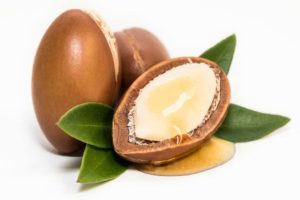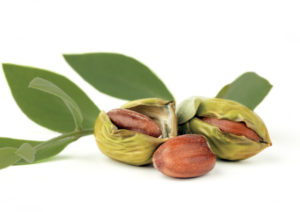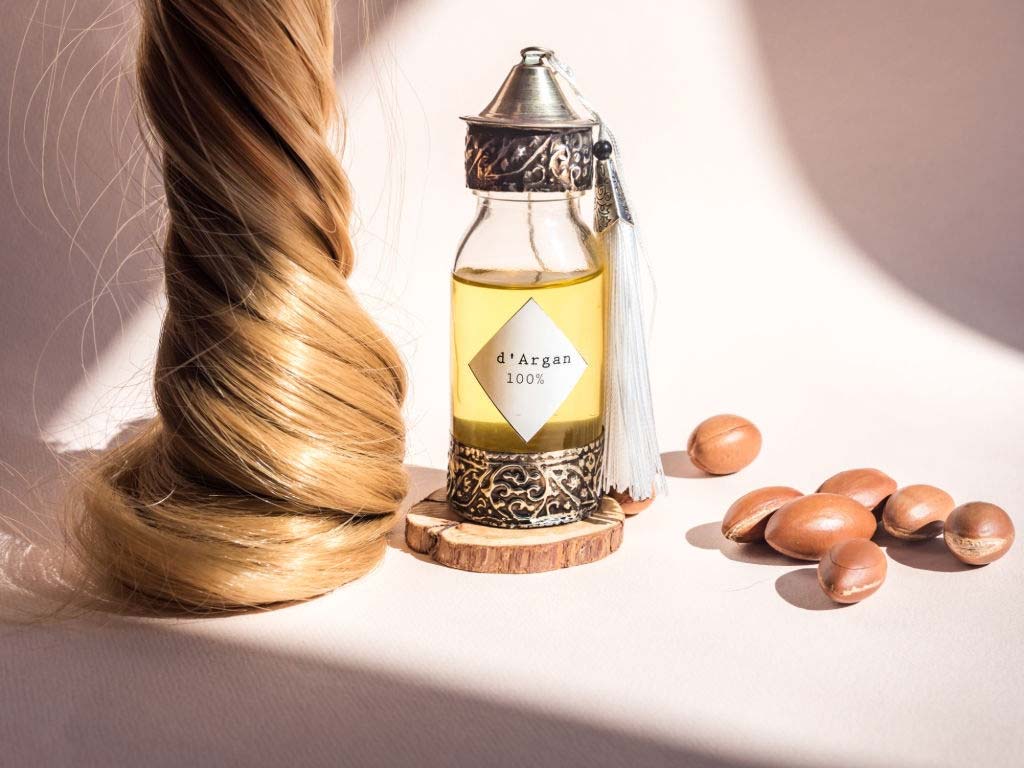Jojoba Oil vs. Argan Oil for Hair Growth
 Natural oils are one of the wheels that make the world of cosmetics spin. These oils contain vitamins A, E, and many others. Natural oils moisturize, nourish, and protect, they can be used in their pure form and as an additive to daily care for face and hair. They perfectly cope with skin imperfections, pigmentation, flakes of skin, or even vice versa. Since the components of oils are similar to sebum, they also help to regulate the sebum. Even when applied to oily skin, it does not stimulate the development of extra sebum.
Natural oils are one of the wheels that make the world of cosmetics spin. These oils contain vitamins A, E, and many others. Natural oils moisturize, nourish, and protect, they can be used in their pure form and as an additive to daily care for face and hair. They perfectly cope with skin imperfections, pigmentation, flakes of skin, or even vice versa. Since the components of oils are similar to sebum, they also help to regulate the sebum. Even when applied to oily skin, it does not stimulate the development of extra sebum.
So what is Argan Oil?
Argan oil is one of the rarest oils in the world due to the limited habitat of the Argania Spinosa (argan tree). The argan tree only grows in Morocco. The fruits of the Argan tree are being dried in the sun and its peel is taken off from the pulp. Inside this pulp, there are the seeds, covered in a very strong shell. After removing the shell, argan oil is squeezed out of the seeds by the method of cold pressing.
tree). The argan tree only grows in Morocco. The fruits of the Argan tree are being dried in the sun and its peel is taken off from the pulp. Inside this pulp, there are the seeds, covered in a very strong shell. After removing the shell, argan oil is squeezed out of the seeds by the method of cold pressing.
And what is Jojoba Oil?
 Jojoba oil is obtained from the nuts of the jojoba bush. This plant grows in the desert regions of the USA, Brazil, Mexico, and Egypt. Jojoba oil is retrieved by cold pressing the seeds. Jojoba oil actually is a natural liquid wax that can be stored for a very long time without oxidizing.
Jojoba oil is obtained from the nuts of the jojoba bush. This plant grows in the desert regions of the USA, Brazil, Mexico, and Egypt. Jojoba oil is retrieved by cold pressing the seeds. Jojoba oil actually is a natural liquid wax that can be stored for a very long time without oxidizing.
Argan Oil Vs Jojoba Oil for Skin Care
Argan oil and jojoba oil are both excellent products that can be used in the daily care of the skin and hair. Moreover, both oils have several healing properties. Listed below there are some of the most important comparative characteristics of argan oil and jojoba oil. This may help you to choose the oil which can be most beneficial to you.
Argan Oil and Jojoba Oil – their Moisturizing Effects
Both argan oil and jojoba oil are great addition for properly moisturizing your skin. Argan oil deeply nourishes and moisturizes the skin. Jojoba oil creates a breathable imperceptible layer, which helps maintain moisture inside the skin.
Anti-ageing Effects of Jojoba Oil and Argan Oil
After a certain age, we may all notice some changes in our skin, whether it is the appearance of wrinkles or the skin may lose its smoothness. Argan oil and jojoba oil both are very effective oils in cases of negative age-related changes (for example, the appearance of wrinkles, loss of turgor pressure, and age-related pigmentation). In order to smooth out age related and facial wrinkles, making the skin become more firm and more elastic, applying jojoba oil or argan oil on the skin daily can be very beneficial.
 Jojoba Oil and Argan Oil for Sun Protection
Jojoba Oil and Argan Oil for Sun Protection
Jojoba oil has a protective factor of SPF4, it, therefore, helps protect the skin from sunburn.
Argan oil does not have protective properties.
Argan Oil and Jojoba Oil against Skin Diseases
Due to its anti-inflammatory and antimicrobial properties, jojoba oil is very useful in the fight against acne. This oil reduces dry skin, peeling, and itching, and is therefore especially indicated in the treatment of psoriasis and eczema.
Argan oil is also effective for the treatment of skin diseases such as psoriasis, eczema, neurodermatitis, and the effects of sunburn.
Argan Oil vs Jojoba Oil for Nails
Both of these natural oils are ideal for caring for the cuticle and nails. Massaging a nail with argan oil or jojoba oil helps prevent cuticle growth and evens out the surface of the nails.
Argan Oil and Jojoba Oil in daily Skin Care of the Body
Jojoba oil and argan oil bore are effective in stimulating skin regeneration. These oils can help to reduce scars and stretch marks on the body. Both jojoba and argan oil can be an excellent companions in the fight to prevent stretch marks during pregnancy or during weight loss.
Comedogenic of Argan Oil and Jojoba Oil – Dermatology has compiled a table mentioning the degree of comedogenic for the oils most commonly used in cosmetology, rating all oils from 0 to 5.
Argan oil has an index of 0, which means that this oil will not clog the pores and is suitable for any skin type.
Jojoba oil has an index of 2, and is, therefore, a fairly light oil, quite suitable for dry and normal skin.
Shedding Effect of Argan Oil and Jojoba Oil – The plant pigments polyphenols contained in argan oil acts on the upper layer of the dermis relieves it of pigmentation, and has a slightly exfoliating effect.
Jojoba oil does not have this property.
Content of Fatty Acids in Argan Oil and Jojoba Oil – All oils contain certain amounts of essential fatty acids – linoleic acid (Omega-6) and oleic acid (Omega-9). From these acids, linoleic acid is the most important for maintaining healthy skin. It restores the skin barrier, reduces transdermal water loss, it is an antioxidant which means that it provides an anti-inflammatory effect. Argan oil contains 33% of linoleic acid, and the content in jojoba oil is 5%.
Oleic acids (Omega-9) moisturize the skin and increase its permeability, and therefore it promotes the transportation of active components.
The content of oleic acid in argan oil is 46% and in jojoba oil 15%.
Argan Oil vs Jojoba Oil for Hair
Jojoba oil is ideal for daily hair care and is suitable for any hair type. It can especially help to restore dyed, dry and brittle hair. The wax contained in jojoba oil protects and renews the hair, providing it with its natural shine and strength. Jojoba oil also is a great remedy for dry scalp, due to the presence of trace elements such as zinc and selenium, it eliminates dandruff. Furthermore, jojoba oil is very effective against hair loss. It dissolves sebaceous accumulations in the hair follicles, which contributes to hair growth.
Argan oil is used widely for hair care as well, as it is a powerful natural remedy that restores the structure of damaged hair. Argan oil works against brittle hair and split ends, it gives the hair a healthy shine and softness, and protects the hair from the harmful effects of environmental factors and influences.
Argan oil and Jojoba oil, are two astonishingly good products containing the perfect benefits for the daily care of your skin and hair! Which one is your favorite?

